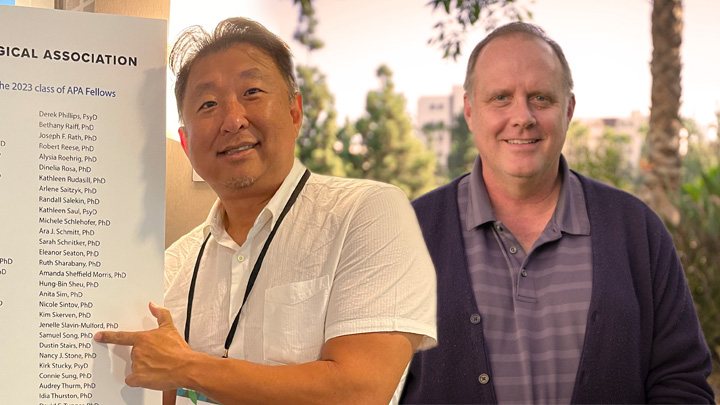Validation: Song, Degeneffe take their place as APA fellows

Two San Diego State University College of Education professors have earned a significant national honor in the field of psychology. Samuel Song and Charles Degeneffe have both been named Fellows of the American Psychological Association (APA).
With more than 157,000 members, APA is the nation's top scientific and professional organization in the field of psychology. Fewer than 5% earn the title of fellow.
Song, director of the school psychology program and COE’s associate dean for diversity, equity and inclusion, has actually been a fellow since the beginning of the year. He and other members of the Class of 2024 were honored in a special pinning ceremony in August at the APA Convention in Seattle.
Degeneffe, professor of rehabilitation counseling and chair of the Department of Administration, Rehabilitation and Postsecondary Education, was informed over the summer that he will be a part of APA’s Class of 2025. He will be pinned at next year’s conference in Denver.
"It says a lot about the quality of our institution,” said Song, who is a fellow in APA’s Division 16 (school psychology). “I think it shows that the College of Education and SDSU are national players.”
Meaningful and humbling
Degeneffe joined the faculty in the Department of Administration, Rehabilitation and Postsecondary Education in 2005, coordinating SDSU's rehabilitation counseling program (ranked No. 3 nationally by U.S. News and World Report) for nine years. He has served as chair of ARPE since 2021.
“It's great to have recognition from your colleagues,” said Degeneffe, who thanked Dean Y. Barry Chung — also an APA fellow — for serving as one of his four nominators. “I'm at a point where I've been a professor for more than 20 years and naturally, there's a question of what impact I have made on the field. I think this type of recognition is validating — my colleagues believe that I've made substantive contributions. For me that's very meaningful and very humbling.”
Degeneffe, whose research focuses on how families adjust and cope with acquired brain injuries, is a fellow in Division 22 (rehabilitation psychology). He is also interested in eventually applying as a fellow in Division 19 (military psychology) as his work has increasingly centered on servicemembers and veterans.
“Whatever I do in the field has been through mentoring, the support of those who came before me,” he said. “And likewise, I try to do that for other people that I meet in the field. I anticipate that this fellowship might give more opportunities for people to seek me out for mentoring and support.”
Family first
For Song, who has devoted his career since to studying school culture and climate and advancing social justice and antiracism initiatives, the honor was gratifying particularly because it validated a decision he made earlier in his career to put his family first.
Early in his career, Song was a researcher at the University of North-Carolina Chapel Hill — exactly the kind of R-1 institution that would rapidly propel you to an APA fellowship. But he wanted to be able to spend more time with his wife and son and decided to move back to the West Coast where they had family.
He took a professorship at Seattle University, a Jesuit university where the focus is on teaching. Song still worked to pursue national leadership in school psychology, eventually moving to the University of Nevada-Las Vegas and then, last year, to SDSU.
“That's why I'm especially proud of it — I chose my family and it didn't really hurt me in terms of outcomes,” Song said. “I mean, it took me longer, right? But it makes it a little bit more meaningful.”
With the APA conference in Seattle he was able to have multiple family members in attendance.

